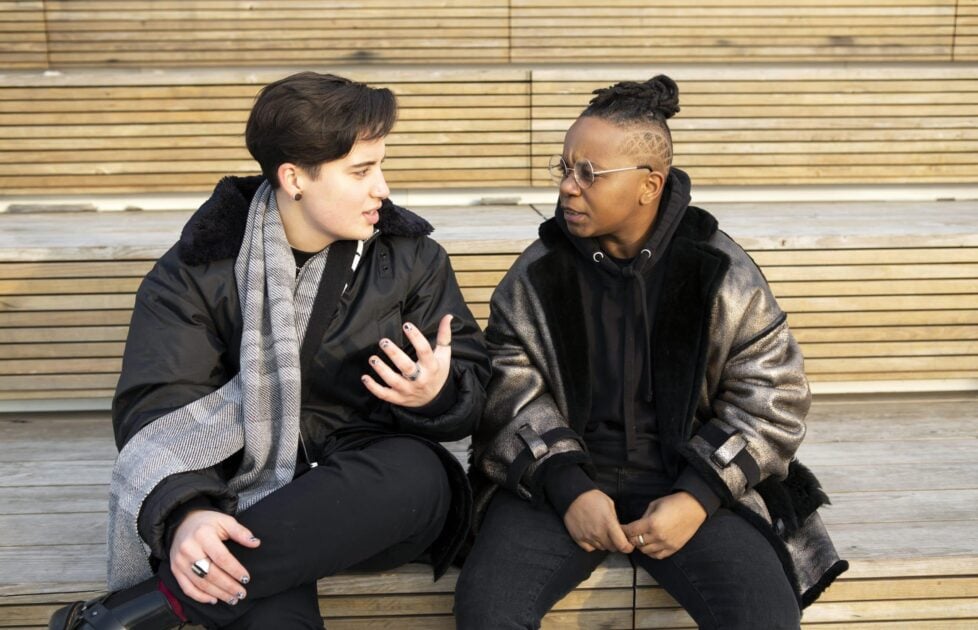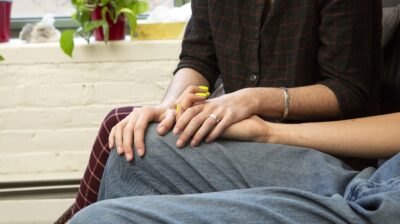Help for dealing with transphobia and discrimination
If you are experiencing transphobia there is help available


Being a trans young person can be difficult for many reasons, especially if you’re experiencing transphobia or abuse. Transphobia or cis-sexism are terms to describe being discriminated against because of your gender identity or gender expression. This is where you are being picked on, treated differently, experiencing violence, exclusion or aggression because you are trans. It is important to remember that if you experience transphobia this is no reflection on you and who you are. You do not deserve to experience any form of discrimination for being your genuine self and those who truly care about your wellbeing will be supportive of who you are.
Ways to help deal with transphobia
Speak to someone about it
It can be very tempting when you are in a situation where you are being discriminated against to cope by avoiding thinking about what is happening. But telling someone can help make you feel better and may improve your situation. If you are close to your family, speaking to them can help you to process the experience and find advice on the best steps to take next.
If you are in school your best option may be to speak to a teacher that you feel close to or to the school’s guidance counsellor. If you feel you do not feel that you have someone close to you to talk to there are always supports to help, and safe LGBTI+ youth services where you will find acceptance for who you are. You can find a list of relevant support services for you at the end of the article.
Reacting to violence
As a trans young person you may experience violence or aggression towards you, which can leave you hurt and feeling extremely vulnerable. It is important to remember that no one has the right to be physically violent or abusive to you, be that at home or anywhere else. If someone threatens you or is in any way violent or abusive, remove yourself from that situation and if you feel comfortable to do so call the Gardaí (999 or 112). You can also ask to speak with a specially trained Garda Diversity Officer.
If you do not feel comfortable contacting the Gardaí for help, there are other LGBTI+ youth services, domestic abuse services and crisis services that can support you (see services at end of article). Violence can happen anywhere; it can be obvious but may not be so. Bullying in school and work is a form of violence and you do not deserve to be treated this way or have to tolerate it.
If you feel like someone is consistently using behaviour that makes you feel bad, this may be bullying and/or harassment. If some is picking on you, frequently putting down or making comments about you this is a type of bullying. Regardless of the type of abuse, if you are struggling to cope with discrimination, transphobia or bullying, there is always support available to help.
People you can speak to about bullying and harassment:
- In work you can speak to your manager or to HR about what is happening
- In school you can speak to a teacher you trust or a counsellor
- In the street you can speak to the Gardaí
- You could also speak to a counsellor, mental health professional, doctor or someone else that you trust
- You can also speak to LGBTI+ support services (see below)
Dealing with abuse at home
The reality is that home isn’t always a safe space for trans young people. If someone you live with is abusive or violent towards you it can be extremely difficult, especially if you have nowhere else to turn. Speaking to someone about what you are experiencing can help, and you should never feel you have to cover up how a family member or partner treats you.
If there is not someone in your life you can speak to, there are a wide range of support services that can help. Remember that if you are ever in immediate danger you can call the emergency services for help (999 or 112). If you are under the age of 18 reporting abuse at home doesn’t automatically mean that you’ll be taken away from your family. Social Services will try to work out a situation where they can support your family to ensure your needs are met, but still remain with your family. If you are worried about what will happen if you report abuse by your parents, speaking to an LGBTI+ services can help.
Joining an LGTBI+ Youth Group
If you are experiencing transphobia or discrimination it can a difficult and isolating experience. Finding a place and people that you feel you belong with and are accepted for who you are can make a big difference in supporting your mental health and improving your daily life. Joining an LGTBI+ youth group is a great way to meet people with similar experiences to you, who can help support you in what you may be experiencing. Youth groups can offer advice and friendship as well as a safe space to be yourself and grow and develop as a person. Read our article on finding the right youth group for you.
Supports if you experience transphobia
BeLonGTo
Online LGBTI+ Youth Group for New Members
BeLonGTo’s online LGBTI+ youth group for new members is starting on Monday, January 11th 2021. This group is a safe space to meet people, chat, have fun, and learn a little about gender and sexuality. This online group is open to any LGBTI+ young person between 14-23 years. Sign up to BeLonGTo.
Crisis Counselling with Pieta
Working with Pieta, BeLonGTo are providing a free crisis counselling service for LGBTI+ youth who are self-harming or thinking of suicide. Their therapist, Nash, is friendly and welcoming, and will listen to you in a safe, non-judgmental space and work through whatever is worrying you.
Talk to their Youth Workers over Text, Phone or Email
Reach out and talk to BeLonGTo’s expert Youth Workers Shane, Kate and Sean in confidence about whatever is on your mind. They are happy to listen, provide you with information and referrals if needed. Click here to get in touch today.
Youth Groups Nationwide
BeLonGTo’s youth groups are safe spaces for LGBTI+ young people to meet, share experiences, and chat. Their groups are now being delivered virtually.
LGBT Ireland
- LGBT Helpline is available on 1890 929 539
- There is also a Family Support Line on 01 907 3707
- There is an instant messaging service available at lgbt.ie
- You can email [email protected] for support or information as face to face services are currently closed
Women’s Aid
Women’s Aid offer a listening service to those experiencing domestic violence through their free 24 hour helpline The helpline offers confidential information, support, and understanding to women in Ireland experiencing domestic abuse. The helpline can also offer information and advice to friends or family who are concerned about the safety of someone they know.
- Call 1800 341 900
- For those who do not speak English as their first language, you can call the interpretation service on 1800 341 900, from 8am – 8pm, 7 days a week
- For those who are deaf or hard of hearing, you can find information on their text service here
Men’s Aid Ireland
Men’s Aid provide information and advice to men experiencing domestic abuse in Ireland. Their services include a national confidential helpline, legal information and advice, and counselling, among others.
- You can contact their national helpline at (01) 554 3811 or email [email protected]
Dublin Rape Crisis Centre
The Dublin Rape Crisis Centre offer a free, national 24-hour helpline for anyone who has experienced sexual assault, rape or childhood sexual abuse.
- Call 1800 77 88 88 for support
Boots Pharmacies
Boots Pharmacies now offer a “Safe Space” for people experiencing domestic violence. In this confidential space, people can contact one of the 39 frontline specialist domestic abuse services across the country and access free, confidential support and advice.
Find out more about the Safe Spaces.
Feeling overwhelmed and want to talk to someone?
- Get anonymous support 24/7 with our text message support service
- Connect with a trained volunteer who will listen to you, and help you to move forward feeling better
- Whatsapp us now or free-text SPUNOUT to 50808 to begin.
- Find out more about our text message support service
If you are a customer of the 48 or An Post network or cannot get through using the ‘50808’ short code please text HELLO to 086 1800 280 (standard message rates may apply). Some smaller networks do not support short codes like ‘50808’.






